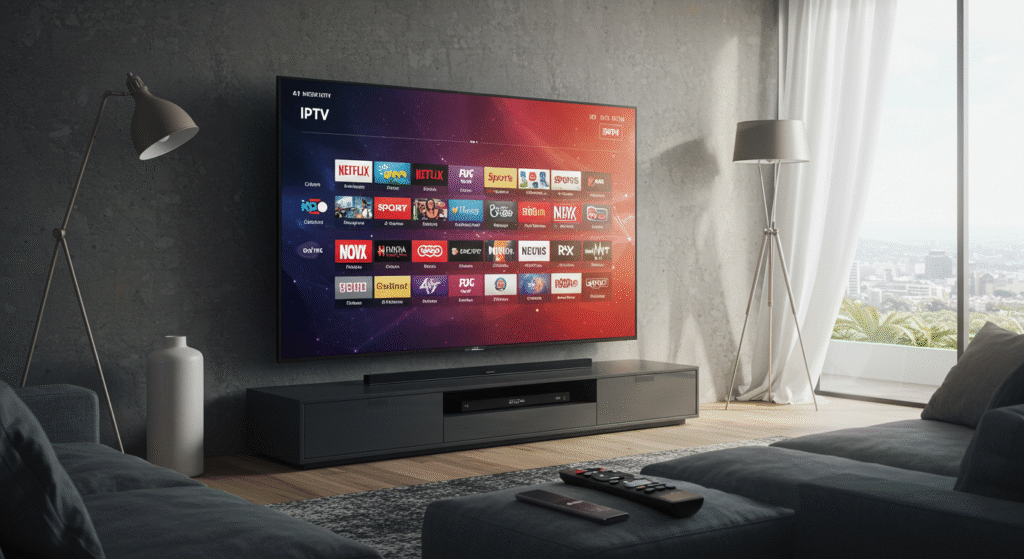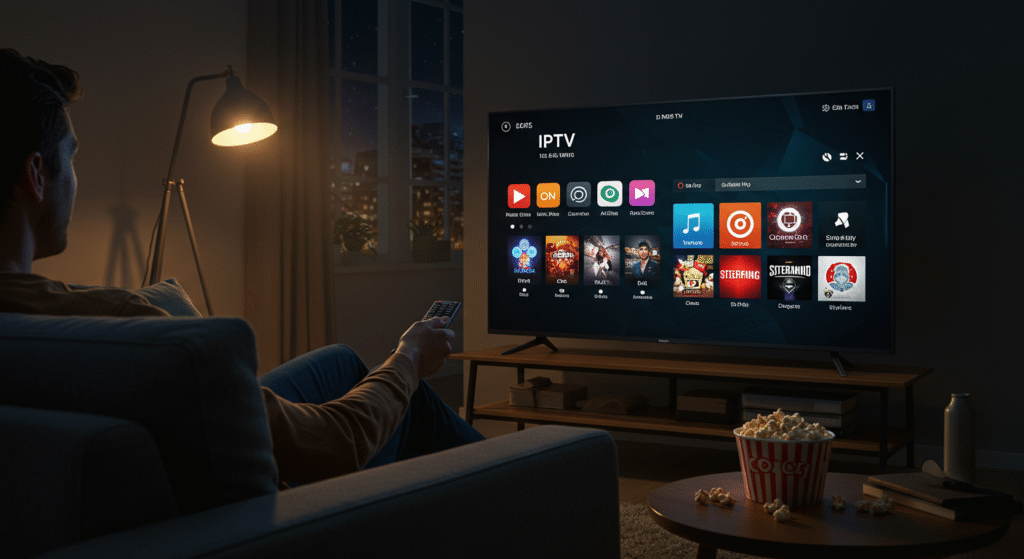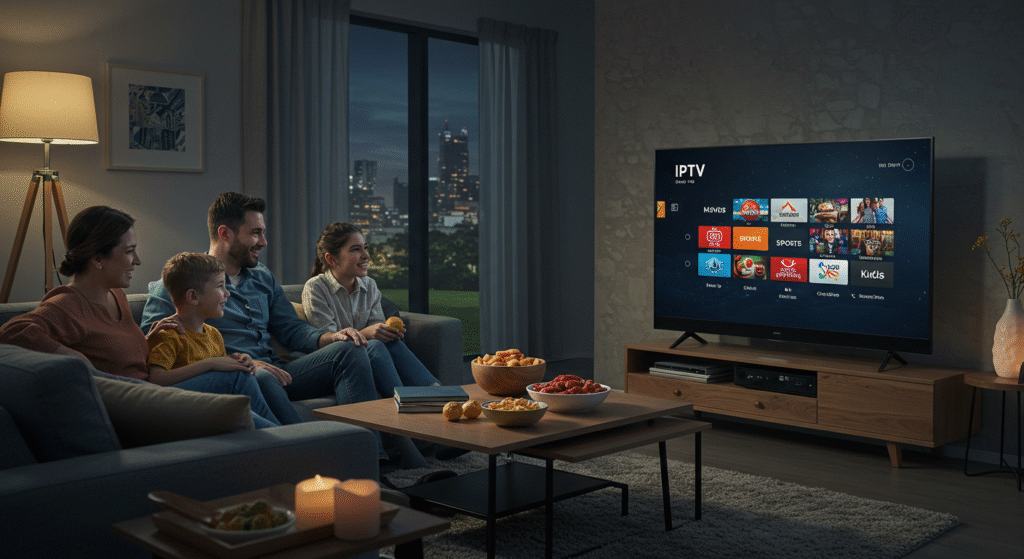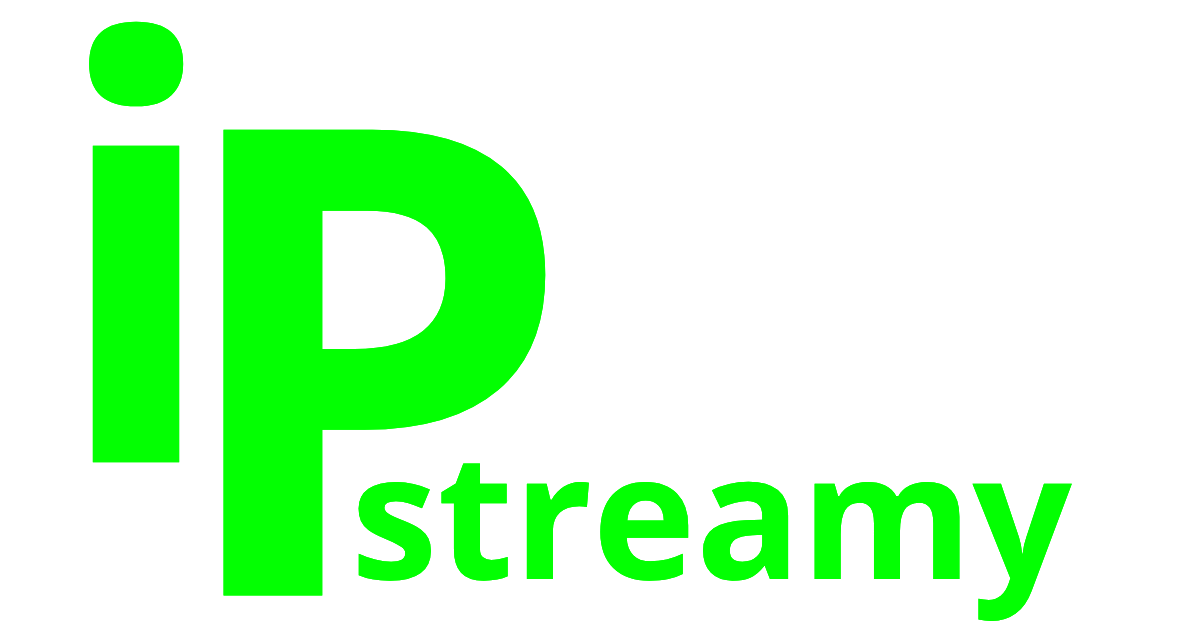I have witnessed a significant shift in how people consume television content, with Internet Protocol Television (IPTV) emerging as a popular alternative to traditional broadcasting methods.

IPTV delivers television content over the internet, allowing users to stream their favorite shows and channels directly to their devices. This technology has revolutionized the way we watch TV, offering greater flexibility and a more personalized viewing experience.
As I explore the world of IPTV, it becomes clear that this technology is not just a trend but a significant development in the television industry, providing users with on-demand access to a wide range of content.
Table of Contents
What is IPTV? Understanding the Technology
Understanding IPTV requires a look into its underlying technology and how it differs from conventional television services. IPTV, or Internet Protocol Television, is a system where television services are delivered through the internet.
The Definition and Evolution of IPTV
IPTV is defined as a service that provides television programming through a broadband connection. Over time, IPTV has evolved from a simple alternative to traditional TV to a robust platform offering a wide range of channels and on-demand content. This evolution has been driven by advancements in internet technology and the increasing demand for flexible viewing options.
How IPTV Differs from Cable and Satellite TV
IPTV differs significantly from cable and satellite TV in its delivery method. While cable and satellite TV rely on traditional broadcast infrastructure, IPTV uses the internet to stream content. This difference allows IPTV to offer more personalized viewing experiences, including on-demand content and time-shifting capabilities.
| Feature | IPTV | Cable/Satellite TV |
|---|---|---|
| Delivery Method | Internet | Cable/Satellite Infrastructure |
| On-Demand Content | Available | Limited |
| Personalization | High | Low |
How IPTV Technology Works
IPTV providers rely on sophisticated technology to stream content directly to users’ devices, bypassing traditional broadcast methods. This technology involves a complex interplay of various components that work together to deliver high-quality video and audio content.
The Technical Infrastructure Behind IPTV
The technical infrastructure behind IPTV is multifaceted, involving several key elements that ensure reliable and efficient content delivery.
Servers and Content Delivery Networks
IPTV services utilize powerful servers to store and manage vast libraries of content. These servers are often distributed across content delivery networks (CDNs) that help reduce latency and improve streaming quality by caching content at multiple geographic locations.
Internet Bandwidth Requirements
A stable and fast internet connection is crucial for IPTV streaming. The required bandwidth varies depending on the quality of the stream, with standard definition (SD) requiring around 3 Mbps, high definition (HD) needing about 5-7 Mbps, and 4K content demanding 25 Mbps or more.
Streaming Protocols Used in IPTV
IPTV streaming relies on various protocols to deliver content efficiently. Some of the most common protocols include:
- UDP (User Datagram Protocol)
- TCP (Transmission Control Protocol)
- HTTP (Hypertext Transfer Protocol)
- RTSP (Real-Time Streaming Protocol)
These protocols work together to ensure that content is delivered smoothly and efficiently, with some protocols prioritizing speed and others focusing on reliability.
| Protocol | Description | Use Case |
|---|---|---|
| UDP | Prioritizes speed over reliability | Live streaming, online gaming |
| TCP | Ensures reliable data transfer | On-demand content, file transfers |
| HTTP | Facilitates content delivery over the web | IPTV streaming, web browsing |
| RTSP | Controls streaming media servers | Live streaming, surveillance |
The Benefits of Using IPTV Services
Using IPTV services can significantly enhance your viewing experience by offering a range of benefits that traditional TV services often can’t match. With IPTV, you have access to a more personalized and flexible way of consuming television content.
Content Variety and Global Access
One of the key advantages of IPTV is its vast content variety. IPTV services provide access to a wide range of channels and on-demand content, including international broadcasts that cater to diverse audiences. This global access allows users to stay connected with their cultural roots or explore new cultures through various TV shows and movies.
Cost-Effectiveness Compared to Traditional TV
IPTV services are often more cost-effective than traditional cable or satellite TV. They offer flexible subscription plans that can be tailored to individual viewing preferences, potentially reducing monthly bills. Additionally, IPTV eliminates the need for expensive hardware installations, further lowering costs.
On-Demand and Time-Shifted Viewing
Another significant benefit of IPTV is its ability to offer on-demand and time-shifted viewing. Users can watch their favorite shows at any time, pause live TV, and even rewind or fast-forward through content. This flexibility is a significant departure from the rigid schedules of traditional TV viewing.
Getting Started with IPTV: A Step-by-Step Guide
Getting started with IPTV is easier than you think, and here’s how. To begin your IPTV journey, you’ll need to understand the basic requirements and setup process.
Required Hardware for IPTV
To enjoy IPTV, you’ll need a few pieces of hardware. First, consider the devices compatible with IPTV services.
Compatible Devices
IPTV can be accessed on various devices, including smart TVs, smartphones, tablets, and dedicated IPTV set-top boxes. Ensure your device supports IPTV apps or has the necessary software.
Internet Connection Requirements
A stable and fast internet connection is crucial for uninterrupted IPTV streaming. I recommend a minimum speed of 5 Mbps for standard definition and 25 Mbps for high definition. For an iptv subscription that offers multiple channels, a faster connection is advisable.
Setting Up Your IPTV Connection
Once you have the necessary hardware, it’s time to set up your IPTV connection. This involves installing the required apps and configuring your network.
Installing IPTV Apps and Software
Download and install the IPTV app or software recommended by your iptv subscription provider. Most providers offer apps for various devices, making it easy to access your iptv channels.
Configuring Your Network
Ensure your device is connected to a stable internet network. You may need to configure your router or network settings to optimize IPTV streaming quality.

By following these steps, you can enjoy a seamless IPTV experience with access to a wide range of iptv channels and content.
Types of IPTV Services Available
When it comes to IPTV, there are several types of services available, each with its unique features. The variety in IPTV services allows consumers to choose the option that best fits their viewing habits and budget.
The IPTV market is primarily dominated by two main categories of services: subscription-based and free or premium options. Understanding these categories is crucial for making an informed decision.
Subscription-Based IPTV Providers
Subscription-based IPTV providers offer a wide range of channels and content for a monthly or annual fee. These services often include:
- Access to a vast library of on-demand content
- Live TV channels, including sports and news
- Multi-device support, allowing viewing on various platforms
Examples of popular subscription-based IPTV providers include Netflix and Hulu, which offer a mix of on-demand content and live TV.
Free and Premium IPTV Options
Free IPTV options are also available, often supported by advertisements. These services may offer limited content compared to their premium counterparts.
Premium IPTV services, on the other hand, provide high-quality content without ads, along with additional features such as:
- Enhanced video quality (HD, 4K)
- Exclusive content not available on free services
In conclusion, the choice between subscription-based, free, and premium IPTV services depends on individual preferences regarding content variety, video quality, and budget.
Legal Considerations and IPTV in the United States
The rise of IPTV has raised several legal questions, particularly regarding copyright and licensing issues. As IPTV technology continues to evolve, understanding these legal considerations is crucial for both providers and consumers.
Understanding Copyright and Licensing Issues
IPTV services must comply with copyright laws by obtaining the necessary licenses to stream copyrighted content. Copyright infringement is a significant concern, and IPTV providers must ensure they have the required permissions to broadcast TV channels, movies, and other protected content.
To illustrate the complexity of licensing, consider the following table:
| Content Type | Licensing Requirement | Typical Licensors |
|---|---|---|
| TV Channels | Broadcast rights | TV networks, content owners |
| Movies and Series | Distribution rights | Film studios, distributors |
| Sports Events | Broadcasting rights | Sports leagues, event organizers |
Identifying Legitimate IPTV Services
To avoid legal issues, consumers should identify legitimate IPTV services. Legitimate providers typically have clear licensing agreements and transparent business practices. I recommend checking for reviews, verifying their physical address, and ensuring they provide reliable customer support.

By understanding these legal considerations, consumers can make informed decisions when choosing an IPTV service, ensuring they comply with U.S. laws and regulations.
Troubleshooting Common IPTV Problems
Troubleshooting IPTV issues is essential for a seamless streaming experience. IPTV streaming can be affected by various technical issues, including buffering, connectivity problems, and poor video quality.
Buffering and Connectivity Issues
Buffering and connectivity issues are common problems faced by IPTV users. These issues can be caused by a slow internet connection or network congestion.
Network Optimization Tips
To optimize your network for IPTV streaming, ensure your internet speed meets the required threshold for your chosen streaming quality. You can also try restarting your router or using a wired connection for better stability.
VPN Considerations
Using a VPN can sometimes resolve connectivity issues by bypassing geo-restrictions. However, it can also introduce additional latency, potentially worsening your streaming experience.
Quality and Playback Problems
Quality and playback problems can arise due to issues with your IPTV service provider or your device’s hardware. Ensuring your device is compatible with the IPTV service and that your software is up-to-date can help mitigate these issues.
| Issue | Cause | Solution |
|---|---|---|
| Buffering | Slow internet | Upgrade internet plan |
| Poor Video Quality | Device incompatibility | Update device software |
| Connectivity Issues | Network congestion | Use a wired connection |
Conclusion: The Future of IPTV Technology
As we have explored throughout this article, IPTV offers a revolutionary way to consume television content, providing a clear iptv explanation of how it differs from traditional TV services. The benefits of iptv are numerous, including on-demand access to a wide range of channels and content, cost-effectiveness, and the ability to watch TV on various devices.
With the technical infrastructure behind IPTV continually improving, we can expect even higher quality streams and more reliable services. As more users turn to IPTV, the television industry will likely see a significant shift in how content is delivered and consumed. Understanding the iptv explanation and its benefits is crucial for navigating this changing landscape.
By embracing IPTV technology, viewers can enjoy a more personalized and flexible viewing experience. As the industry continues to evolve, it will be exciting to see how IPTV services adapt to meet the changing needs of consumers.
FAQ
What is IPTV and how does it work?
IPTV, or Internet Protocol Television, is a service that delivers television content over the internet, rather than through traditional cable or satellite TV. It works by streaming content directly to your device, allowing you to watch TV shows, movies, and other video content on demand.
What are the benefits of using IPTV services?
IPTV services offer a range of benefits, including a wide variety of content, global access, cost-effectiveness, and on-demand viewing capabilities. They also provide a more flexible and personalized viewing experience compared to traditional TV services.
What kind of internet connection do I need for IPTV?
To use IPTV, you need a stable internet connection with sufficient bandwidth to support streaming. The recommended internet speed for IPTV is typically at least 25 Mbps for standard definition and 50 Mbps for high definition.
Can I watch IPTV on multiple devices?
Yes, most IPTV services allow you to watch on multiple devices, including smartphones, tablets, smart TVs, and streaming devices like Roku or Amazon Fire TV. You can typically access your IPTV service from anywhere, as long as you have a stable internet connection.
How do I identify legitimate IPTV services?
To identify legitimate IPTV services, look for providers that have a clear and transparent licensing agreement with content owners, offer a stable and reliable service, and provide good customer support. Be wary of services that seem too good to be true or offer pirated content.
What are the most common IPTV problems and how can I troubleshoot them?
Common IPTV problems include buffering, connectivity issues, and quality or playback problems. To troubleshoot these issues, try optimizing your network, checking your internet speed, and adjusting your VPN settings. You can also contact your IPTV provider’s customer support for assistance.
Are IPTV services available in the United States?
Yes, IPTV services are available in the United States, and many providers offer a range of channels and content options. However, be sure to check the provider’s licensing agreements and ensure that they comply with US copyright laws.
Can I get a refund or cancel my IPTV subscription?
Refund and cancellation policies vary depending on the IPTV provider. Check your provider’s terms and conditions to understand their policies and procedures for canceling or requesting a refund for your subscription.
